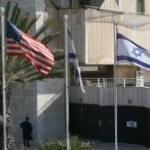 UNITED NATIONS—Increased United States diplomacy vis-a-vis Israel and the Palestinians is set to continue on Wednesday with key meetings following US President Barack Obama’s speech at the United Nations General Assembly. The ongoing efforts come ahead of an anticipated request by the Palestinians for full UN membership and statehood recognition at the UN Security Council. The US is one of five nations with veto powers on the Council and have publicly stated their intention to veto such a Palestinian resolution.
UNITED NATIONS—Increased United States diplomacy vis-a-vis Israel and the Palestinians is set to continue on Wednesday with key meetings following US President Barack Obama’s speech at the United Nations General Assembly. The ongoing efforts come ahead of an anticipated request by the Palestinians for full UN membership and statehood recognition at the UN Security Council. The US is one of five nations with veto powers on the Council and have publicly stated their intention to veto such a Palestinian resolution.
After speaking in the opening day of General Assembly meeting, Obama is set to meet later Wednesday morning with Israeli Prime Minister Benjamin Netanyahu in New York, according to the White House schedule posted on the White House website. The two leaders last met in face-to-face in May.
The White House schedule notes that on Wednesday afternoon Obama is set to meet with Palestinian President Mahmoud Abbas. The Palestinians have so far expressed their determination to defy the American veto threat in the UN Security Council, setting up a potential diplomatic showdown between them and the US.
Meanwhile, on Tuesday, US Secretary of State Hillary Clinton continued her Middle East-related meetings, discussing the region with Saudia Arabia Foreign Minister Saud al-Faisal. According to the transcript of a background briefing for reporters posted on the State Department website, a Senior State Department official said the two diplomats addressed the Israel-Palestinian matter.
The US official was quoted as saying that Clinton “began by thanking the foreign minister for Saudi Arabia’s recent commitment of $200 million to assist the Palestinians. She briefed him on our efforts with the Quartet and others to try to bring the Israelis and Palestinians back to the negotiating table.”
Clinton apparently did not call upon the Saudi official to lead the Palestinians away from their Security Council plans. Said the Senior State Department Official in the briefing, “I would simply say that they compared notes about how we can both play a strong role in encouraging the parties back to the table.”
(By Joshua Spurlock, www.themideastupdate.com, September 21, 2011)
